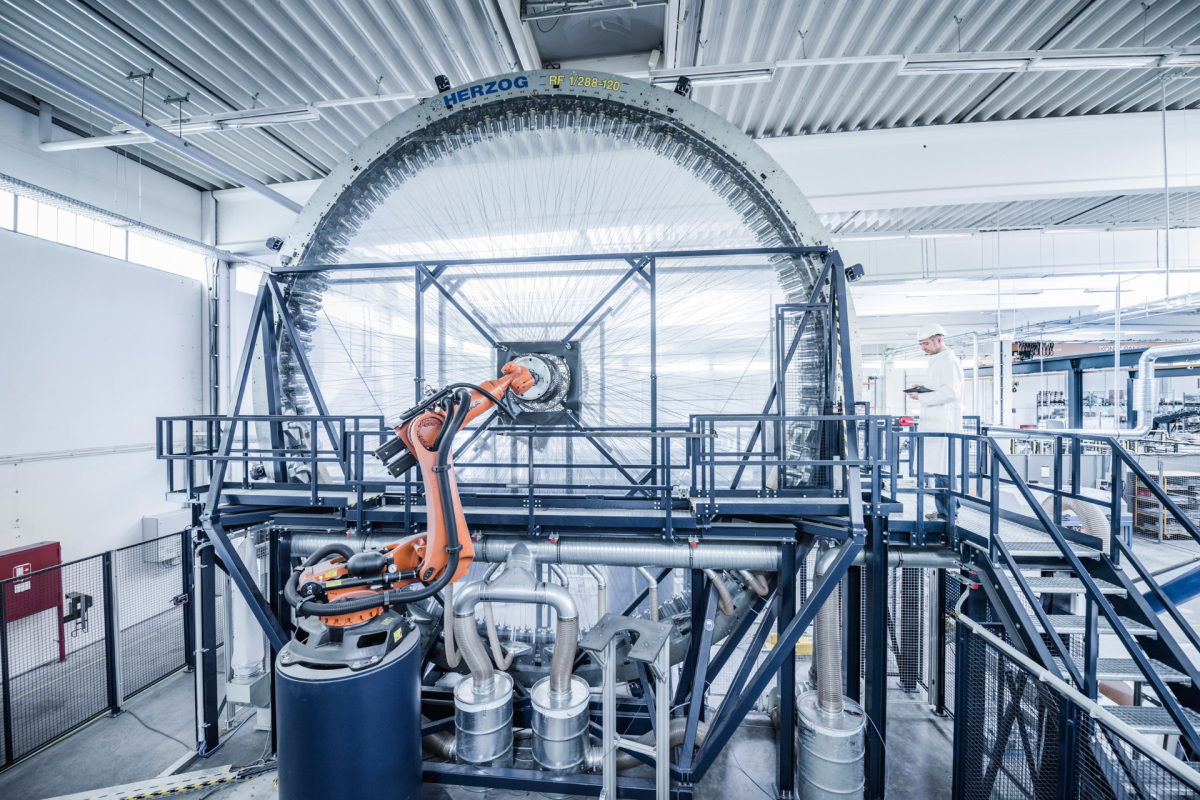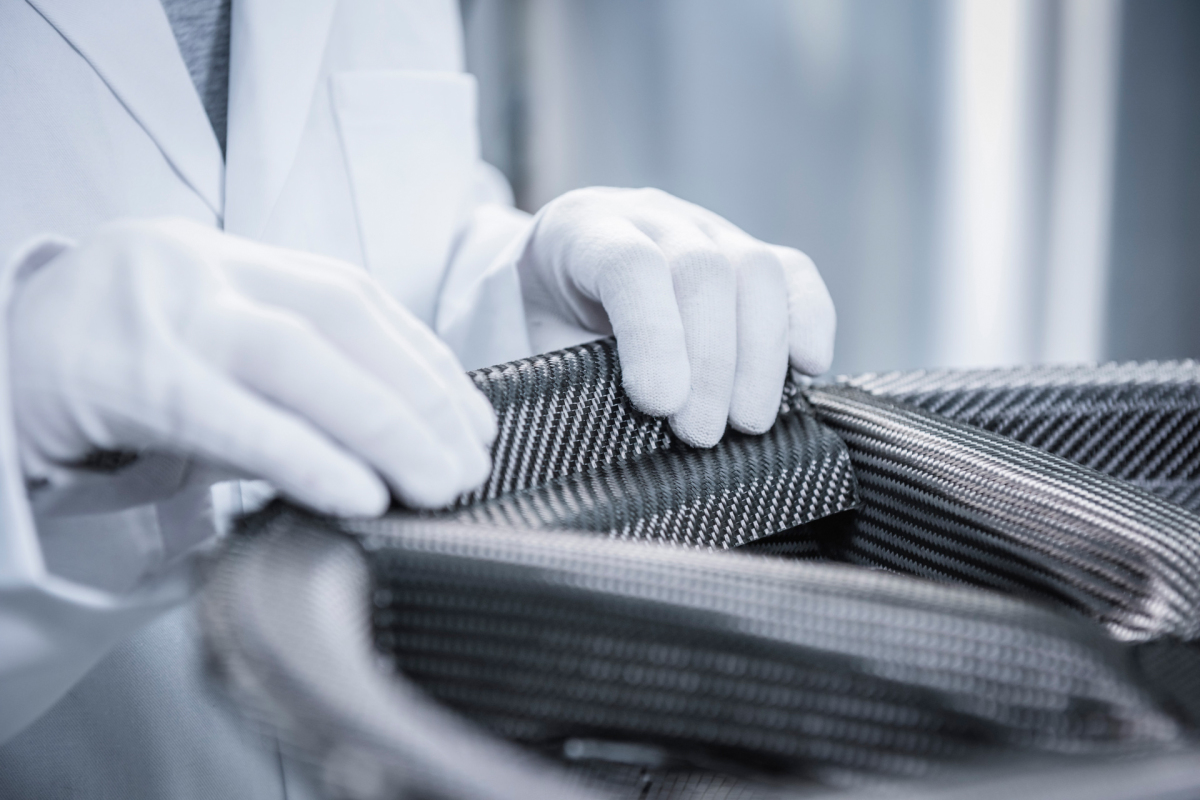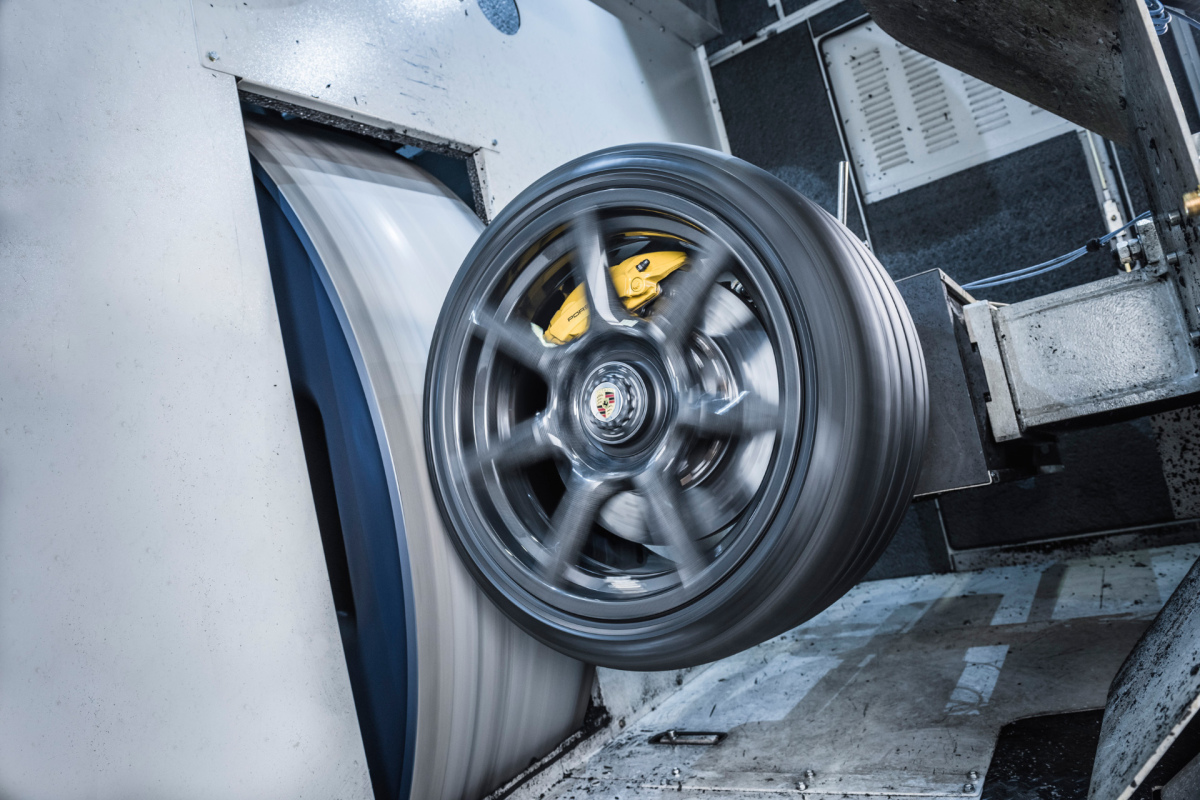
Carbon fiber wheels for high performance road cars aren’t a new thing, Koenigsegg has been using them on some of its models for a few years, and more recently they’ve even been fitted to the Shelby GT350R. But now Porsche has got in on the act, bringing with it an innovative new production process utilizing braided carbon fibers. Its first offering is an optional wheel upgrade for the Porsche 911 Turbo S Exclusive Series.
According to the German automaker, the carbon fiber reinforced polymer (CFRP) wheels which measure 20×9-inch for the front axle and 20×11.5-inch for the rear, weigh around 8.5kg a piece lighter than “standard alloy wheels” (we assume for a comparative size) for a 20 percent weight saving. They’re also 20 percent stronger.

From a performance aspect, lighter wheels bring about a reduction in unsprung weight which improves acceleration, braking and overall roadholding. Porsche says the result is “increased driving dynamics and driving pleasure.”

So how are they made? They’re a two-piece design, but not in the normal sense: the centers are made from 200 individual pieces of carbon fiber fabric, while the rim base is produced from braided carbon fiber. Essentially, the wheel center is braided to the rim base and then impregnated with resin and pre-hardened at high pressure and high temperatures. Following high temperature hardening, there is a long cooling process before a clear-coat is applied and the wheel’s center-locking mechanism is installed. Eight square meters of carbon fiber fabric (or 18km/11mi of carbon fiber strands) goes into each wheel.
In the past, most carbon fiber wheels have been manufactured in a more conventional way using pre-impregnated carbon-fibre fabric, but Porsche’s method offers the advantage of making the carbon’s material structure both denser and more compact, which it says increases rigidity. You can check out the process in the video above.
Of course, the wheels don’t come cheap: in Germany the option price is set at EUR 15,232 including VAT, or around US$17,900. We’re not sure what happens if you curb them, although that may not even bear thinking about…
Brad Lord
Instagram: speedhunters_brad
brad@speedhunters.com








forget curbing them, what will happen when you hit a pothole at a high enough speed?
Properly designed carbon structures can absorb a pretty huge amount of impact force before yielding, but past the yield point will make a catastrophic failure. That's why carbon makes such great impact protection structures; it absorbs a huge amount of force during an impact failure..
If the article says they're 20 percent stronger than the comparable alloy wheels, then that would roughly apply to pothole strikes as well, so they'd be able to withstand higher impact than an alloy wheel before getting damaged.
I would infer that Porsche, Koenigsegg, etc., didn't design and produce a road-capable carbon fiber wheel without considering things like potholes...
do they make roll cages out of carbon fibre?
It doesn't make sense to make a traditional roll cage out of carbon, for reasons of joining, etc., and making full use of the strength properties of carbon doesn't come out looking like something made from tube steel.
But, rollover structures for open wheel cars are routinely made from carbon.
cool thanks
Having worked with carbon fiber before, the material and the way it is made does allow a surprising amount of flex. You can control how much flex you want to have and in what direction you want it, depending on how the material is laid out in the first place. I would imagine they made these wheels to allow a certain amount of flex in the rim, so that it doesn't just completely shatter. I still cringe at the thought of it though!
I love the idea of carbon wheels....but for that price it's such a rip off.
if u curb em just plastidip them ez lol
Hi honey here's your gift, if you curb it, we go into soul crushing debt and I may be forced to sell you into slavery - good luck
God they're so minimalistic and beautiful!
I have BST carbon wheels on my Ducati and they are incredible, they have been out in use for about a decade or more with few known failures on the street. I'm sure these are much more advanced in construction. I wonder how much they account for in performance. Like, could you step down a trim level and still be competitive?
Only a matter of time until a set of these find their way onto a 5 door beige mk2 Golf with a sick static drop....
yeah, probably with wheel spacers weighting more that the wheels xD
I'm sure for regular driving, you won't notice any difference over same-size forged wheels. A decent set of forged wheels are 1/3 the price so unless this would be a dedicated track car, I can't imagine any real reason to fork over that kind of money. I personally think Forgeline alloys would look WAY better, easier to replace and the performance difference is really negligible, I would think on the street. Maybe it's worth it when you need that extra .0008% margin of difference on track. I'm sure the cost is justified in the materials and R&D, just not something, if I were rich would invest in.
-Alex
I'm sure none of these commenters earn enough in a year to pay for these wheels, ass umptions about things you know nothing about are both extremely useful and fun.
Cool.
I'll be waiting for the day when this technology has been around long enough that the common rabble can finally afford to invest. I can barely justify the price of a good set of rotary-forged alloy wheels. These are just ludicrously expensive. This set of wheels costs more than my current car and I bought it new from the dealership!
Thank you for calling it pre-impregnated carbon (pre-preg) and not the made up name "dry carbon". Now if everyone else on this site would follow suit....
well, "dry carbon" is actually a pretty accurate name.
Not really; dry carbon would probably be better described as carbon with no resin applied, not as carbon with B-staged resin already impregnated in it? If you take roll of carbon with no resin, then do impregnation with catalyzed wet resin, how is it "dry"?
No one in the composites industry uses the term "dry carbon" for pre-preg, it's a made-up term by people in the automotive aftermarket and doesn't make any sense. People are generally smart, there's no reason to make up meaningless names just to explain new concepts.
People in the auto industry started calling it dry carbon, to separate how elite their parts were, because glossy (wet) carbon was getting too common. Straight up. Probably .000001 of people using the "dry" see any better results in use than the "wet". Anyone else that tries to tell you different is trying to justify their larger price tag.
Pre-preg is still correct though.
Oops, my phone changed "layup" to "layout".
Glossy carbon has nothing to do with wet layup versus pre-preg. That's all about whether the parts have been gelcoated during layout or clearcoated after layup, whether they have been post sanded to de-gloss them, and what the amount of ply consolidation is (for both wet layup and pre-preg).
The dry looking pre-preg parts (that I believe you're referring to) where the weave texture is visible at the surface, have far too low of a fiber-to-resin ratio, and can only be used for non structural parts like hoods to save a little bit of resin weight at the expense of great amount of strength. Proper pre-preg parts don't look like that. They have a proper fiber to resin ratio, because then you can actually use the physical properties of carbon fiber.
I'm sorry, but marketing bullshit is marketing bullshit. Let's call it what it is. Again, automotive aftermarket making up new names that no one in the automotive or composites industry actually uses.
Thank you for the much more educational reply
Fibreglass with a layer of carbon on top then some clear looks "wet" compared to pre-preg autoclave'd carbon fibre
8.5kg a piece lighter.... I don't think so!
The Porsche 991 "Sport Techno" 20x11" wheel weighs 31 pounds, or 14.09 KG. Doing the math with their stated 20% weight reduction, means it's 8.5kg of lost mass TOTAL, not per wheel. If that's what they meant, the wheels will be 11.27kg/24.8 lbs.
I know this is probably a bit more complex of a process than how carbon fiber wheels for bicycles are made, but those wheels are very prone to shattering or cracking. Even if you don't need to completely replace the wheel fro structural reasons after a crack, the whole structure is weakened. After using a couple sets of carbon wheels most people I know just go back to metal for their bike wheels.
For a typical consumer (not a billionaire, or a trust fund baby, or whatever) who looks at a car like this as an investment both in monetary value and time, any kind of failure prone option won't really be desirable. And I kind of doubt you can easily get a replacement for these. Such a high dollar option surely will mean low production numbers and probably a near made-to-order model. That's a lot of time to be sitting around not enjoying your toy because you hit a pothole.
nothin' Bondo can't fix.....
So far a few of the carbon wheels have the same spoke design. Hmm. something about that configuration?
Most likely a blend of ease of manufacturing, simple/direct load paths along the fiber orientation, and decent aesthetics.
I expect ROTA to make a fake carbon wheel in FRP in the future.
FRP = Fibre Reinforced Plastic

CFRP = Carbon FRP
GFRp = Glass FRP
Now you know
This wheel already is FRP.
I would think Rota would make an alloy wheel and Hydro-Dip it with a carbon fiber graphic.
LMAO!!! A wheel for a car constructed of FRP. I don't even think the DOT would put that through a test phase. Just a simple "Ummm... no? DOT Approval Request: DENIED". I would hope anyways. lol
I'm all for the advantages of carbon fibre, but for the same reason I chose forged magnesium wheels over carbon is the dire boring dull colour of carbon fibre wheels.